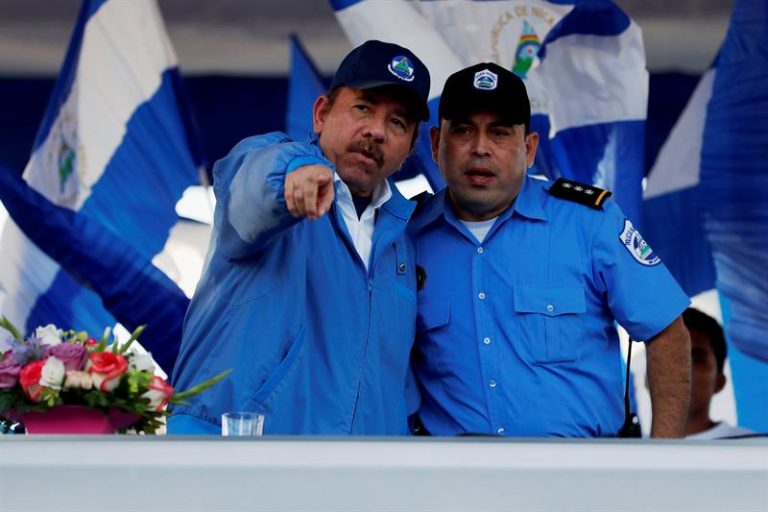8 de marzo 2019

The Return of the Military

PUBLICIDAD 1M
PUBLICIDAD 4D
PUBLICIDAD 5D
“I can tell you that around 40% of the police are not in agreement. There is fear to be denounced. We feel like our hands are tied”.

“I can tell you that around 40% of the police are not in agreement. There is fear to be denounced. We feel like our hands are tied”.
Before the more recent months acting as a false witness, Captain “Leonardo” was ordered to repress the citizenry. He knows firsthand how the paramilitaries were recruited and armed. The arsenal of death used by police and paramilitaries included seven types of weapons of war. Among them are AK 47 rifles, Dragunov, PKM machine guns, M 16, Remington 700, Jericho 941, Mossberg 500.
Where did the weapons come from? Many experts pointed out that only the army had access to these weapons. However, Captain “Leonardo” contributes previously unknown information.
Police headquarters ordered to use the weapons in the warehouses of the Directorate for the Registration and Control of Firearms, Ammunitions, Explosives and Other Related Materials (DAEM in Spanish), revealed “Leonardo.” The DAEM has “representation in the different delegations of the police of the country,” according to its establishing law.
Article 5, paragraph 12, of the DAEM law stipulates that one of its functions is “to act as a depositary for confiscated firearms or taken for administrative infractions, perpetration of crimes or misdemeanors, or when these weapons were confiscated by a final decision of a competent legal authority; which will be given in possession to the Authority implementing the current law, when they are of civilian use.”
That’s to say, the DAEM warehouses are depositories of all confiscated firearms in Nicaragua. Captain “Leonardo” assured that in each department the warehouses of DAEM possess an average of 200 firearms.
“From those warehouses, they ordered to take out weapons and gave them to policemen who were dressed in civilian clothes, and also to civilians (paramilitaries) recruited by the Political Secretary (of the FSLN) in my department. These were guys known to the Mayor’s Office and were armed to shoot,” Captain “Leonardo” narrated.
When the repression broke out, Captain “Leonardo” affirmed that “first they were firing blanks,” but soon began to use lead bullets. An investigation by Confidencial published in May revealed that the caliber of the weapons used corresponded to war rifles. The shots inflicted on demonstrators (mostly young) were accurate, to kill: head, neck and chest.
The fatality of the shots is explained by the Chief of the National Police, Commissioner Francisco Diaz. The high-ranking officer told the Norwegian media that not all the hooded men were “volunteer policemen” but “professional police officers.” Captain “Leonardo” spend the months of May and June dressed in civilian clothes.
“Those were hard days. I did not go home, everything was done at the station: we bathed and ate because the orders were to be patrolling all the time. They cut off our vacations, and if we refused to repress, it was bad for us,” Captain “Leonardo” said. “If you requested your discharge they would not give it to you, and if you returned the uniform as many officers did, they will look for you to imprison you…or they may even kill you.”
In that sense, one of the most notorious cases was the riot policeman Julio Cesar Espinoza, who became a political prisoner for refusing to repress the population. Espinoza was a member of the Special Operations Directorate (DOEP). The young officer did not want to identify demonstrators in the roadblock of Las Esquinas, in Carazo, which is the reason for which he was discharged and arrested.
Also there was the denunciation made by Fatima Vivas, mother of the officer Faber Lopez Vivas, who was “tortured and murdered” after requesting his discharge from police ranks in July of 2018.
“Not all of us are in agreement. I can tell you that about 40% of the police officers are not in agreement with headquarters. Of course, nobody talks about it for fear of being denounced, but among those we trust the most we do comment. We feel like our hands are tied,” said Captain “Leonardo.”
Archivado como:
PUBLICIDAD 3M
Periodista. Destaca en cobertura a violaciones de derechos humanos: desplazamiento forzado, tráfico ilegal en territorios indígenas, medio ambiente, conflictos mineros y ejecuciones extrajudiciales. Premio Iberoamericano Rey de España 2018.
PUBLICIDAD 3D